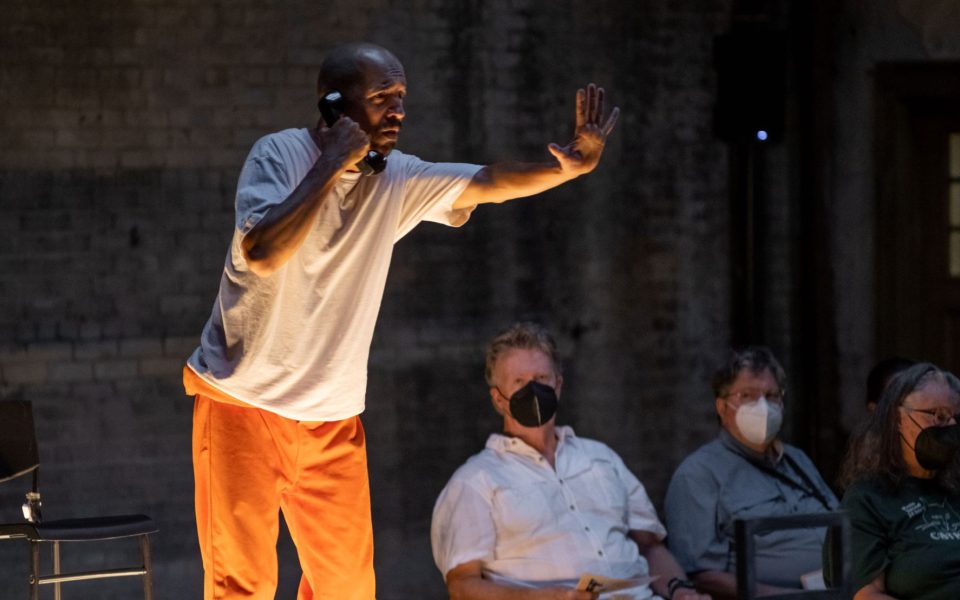Featured photo: Scenes from a performance of The BOX in Detroit (photo by Matthew Van Meter)
Trigger warning: This article contains mentions of sexual harassment.
“Every day is the fucking same.”
Rocky, who’s just arrived at the solitary confinement unit of Cedar Cross Correctional Facility, reads a letter passed to him by the other prisoners — quickly, as communication between inmates is strictly forbidden.
In it, he learns that while they should be getting ten hours of exercise a week, they’re led to what they call “the box,” a concrete yard outside, for just an hour a day.
That’s just one example of the torture the main characters of The BOX face.
Through written correspondence and visits with incarcerated people, and the personal experience of being held in solitary confinement for more than 400 days as a political prisoner in Iran, Pulitzer Center grantee and journalist Sarah Shourd was inspired to write The BOX, a play about “collective resistance and personal transformation.” The Ramkat, in partnership with Disability Rights NC, MUSE Winston-Salem and NC Justice Center will present three performances of the work on Aug. 25-27. According to the organization’s website, the show isn’t just meant to be a form of art. Its mission “is about beginning transformation.” At its various performance locations, the show also “amplifies local programs for collective healing and restorative justice” and after each performance this weekend, a 30-minute post-performance engagement circle will take place for viewers to “collectively process the experience.”

On stage, Shourd aims to bring to light issues faced by incarcerated people and promote political change.
Six gray platforms arranged in a cross serve as prison cells. Three prisoners appear, making their ways to their cells. Jake and Ray wear white shirts, khaki pants and orange Crocs. Victor is barefoot, in a white A-frame tank top and white shorts. He walks as if he’s in pain. He pleads with Correctional Officer Jones for medical attention, who responds by walking away.
The inmates go on to explain the isolating, harrowing experience of solitary confinement. Ray says that because inmates are not taken to the box as often as they should, they look forward to spring months, when the sun is at just the right angle to allow a little light to shine through the small openings of their cells. When they do make it to the box, Victor takes advantage of the pull-up bar and space for a light jog, but the tease of “freedom” doesn’t last long.
“Before I know it, the CO’s back to escort me to my cell, where I sit on my ass for the next 23 hours,” he says.

The BOX explores prison from the perspective of the inmates, but the guards’ struggles as well, showing that not only the incarcerated are subject to humiliation and mistreatment.
Officer Miller, a woman, is constantly subjected to sexual harassment by the prisoners, while her colleague, Officer Jones, faces internal conflict between doing his job and having a hand in oppressing those who look like him as a Black man.
The suffering never stops. The fluorescent lights in the inmates’ cells are always on. The cells are decorated with nothing but a toilet/sink combo and a small desk they call “tombstone.” Ray says the cops regard them as wild animals, and remaining sane is difficult when lunch is two slices of bread, an apple, a packet of mustard and bologna that needs to be held under hot water for two minutes to rinse the slime off. Visitation is nonexistent. Phone calls are allowed in the rare instance of a family death. Ten books or magazines in their cell at a time is all the communication to the outside world they have.
“I haven’t touched another human since I got here,” Ray says.
“Except to be cuffed up,” Victor adds.

Through its unflinching and harrowing look at the realities of solitary confinement, The BOX forces viewers to sit in the deep discomfort of knowing that hundreds of thousands of people experience this unique hell on a daily basis. And that change, if we want it, must be fought for.
As the play progresses, the inmates explain the repetitiveness of each day, and how nothing seems to be changing any time soon. Victor’s been in solitary confinement for three years, Jake for seven years and Ray for 19.
“My universe is eight by twelve feet,” Jake says.
Learn more about The Box: End of Isolation Tour and purchase tickets at endofisolationtour.org and theramkat.com/events.
Friday is Community Impact Night which means all tickets will be 50 percent off with the discount code Impact50, and free tickets are available for systems-impacted folks using the comp code CommunityComp.
Join the First Amendment Society, a membership that goes directly to funding TCB‘s newsroom.
We believe that reporting can save the world.
The TCB First Amendment Society recognizes the vital role of a free, unfettered press with a bundling of local experiences designed to build community, and unique engagements with our newsroom that will help you understand, and shape, local journalism’s critical role in uplifting the people in our cities.
All revenue goes directly into the newsroom as reporters’ salaries and freelance commissions.


Leave a Reply